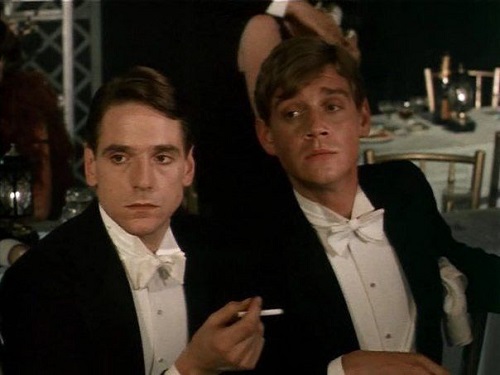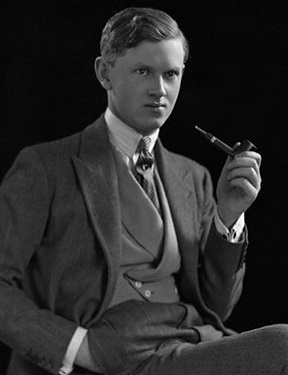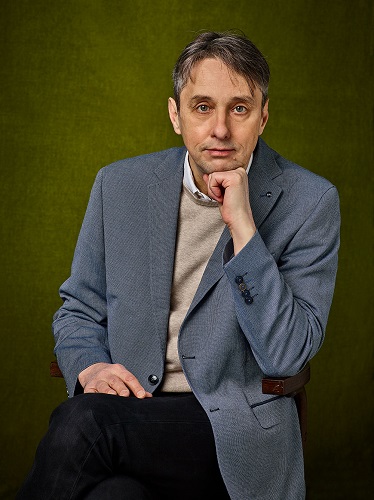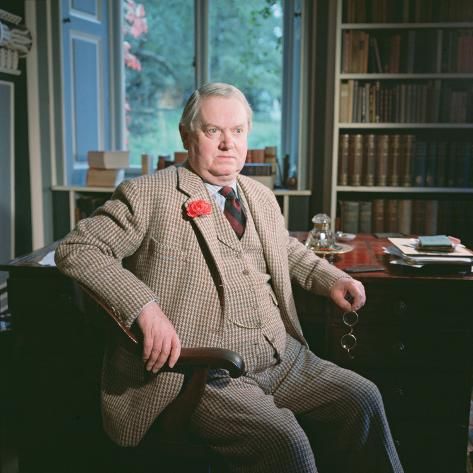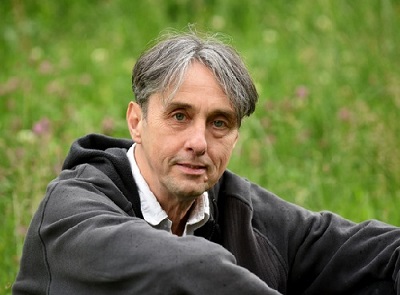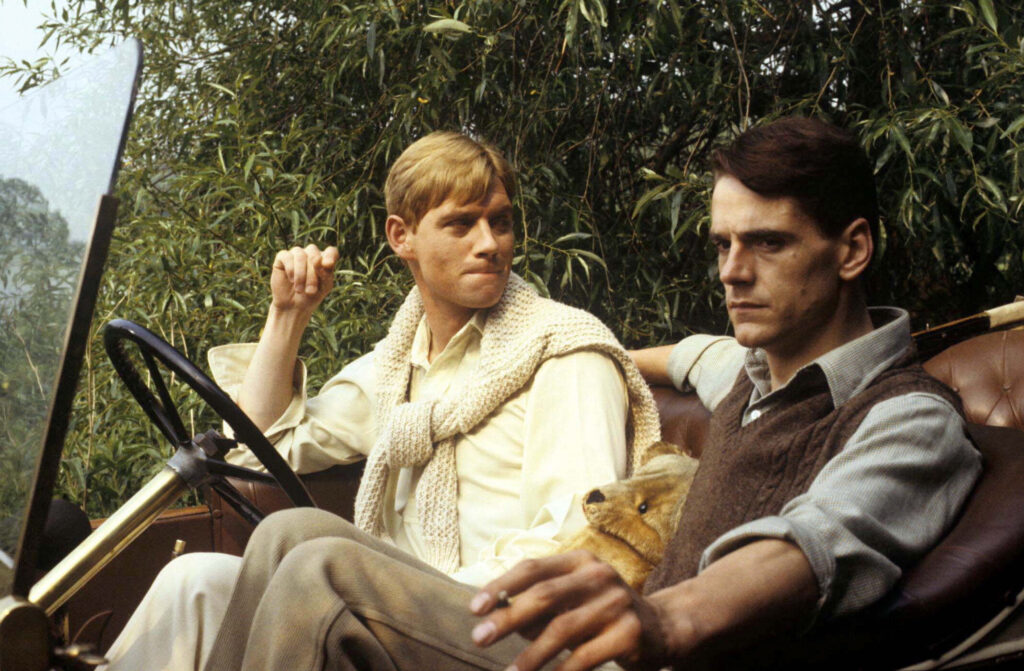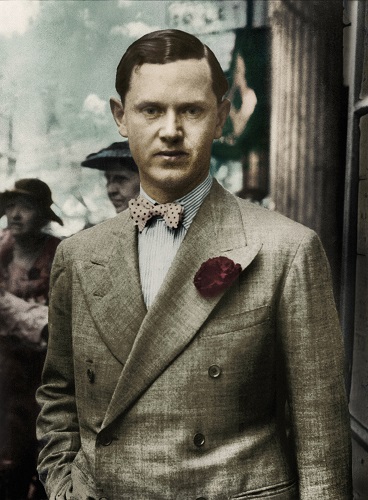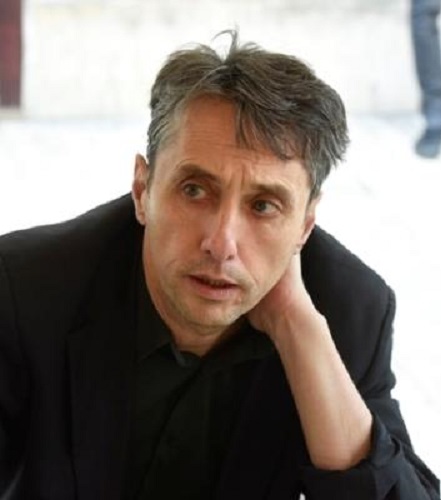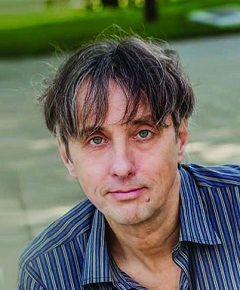De Britse schrijver Evelyn Waugh werd geboren in Londen op 28 oktober 1903. Zie ook alle tags voor Evelyn Waugh op dit blog.
Uit: The Loved One
‘I will give the matter every consideration.’
‘I’ll leave our brochure with you. And now I must hand you over to the cosmetician.’
She left the room and Dennis at once forgot everything about her. He had seen her before everywhere. American mothers, Dennis reflected, presumably knew their daughters apart, as the Chinese were said subtly to distinguish one from another of their seemingly uniform race, but to the European eye the Mortuary Hostess was one with all her sisters of the air-liners and the reception-desks, one with Miss Poski at the Happier Hunting Ground. She was the standard product. A man could leave such a girl in a delicatessen shop in New York, fly three thousand miles and find her again in the cigar stall at San Francisco, just as he would find his favourite comic strip in the local paper; and she would croon the same words to him in moments of endearment and express the same views and preferences in moments of social discourse. She was convenient; but Dennis came of an earlier civilization with sharper needs. He sought the intangible, the veiled face in the fog, the silhouette at the lighted doorway, the secret graces of a body which hid itself under formal velvet. He did not covet the spoils of this rich continent, the sprawling limbs of the swimming-pool, the wide-open painted eyes and mouths under the arc-lamps. But the girl who now entered was unique. Not indefinably; the appropriate distinguishing epithet leapt to Dennis’s mind the moment he saw her: sole Eve in a bustling hygienic Eden, this girl was a decadent.
She wore the white livery of her calling; she entered the room, sat at the table and poised her fountain-pen with the same professional assurance as her predecessor’s, but she was what Dennis had vainly sought during a lonely year of exile.
Her hair was dark and straight, her brows wide, her skin transparent and untarnished by sun. Her lips were artificially tinctured, no doubt, but not coated like her sisters’ and clogged in all their delicate pores with crimson grease; they seemed to promise instead an unmeasured range of sensual converse. Her full face was oval, her profile pure and classical and light; her eyes greenish and remote, with a rich glint of lunacy.”.
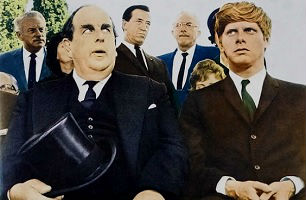
Evelyn Waugh (28 oktober 1903 – 10 april 1966)
Scene uit de gelijknamige film uit 1965 met Robert Morley (Sir Ambrose Abercombie) en Robert Morse (Dennis Barlow)
De Duitse schrijver en journalist Jan Weiler werd geboren op 28 oktober 1967 in Düsseldorf. Zie ook alle tags voor Jan Weiler op dit blog.
Uit: In meinem kleinen Land
“Was ich auch gefragt wurde: Und? Wie sind sie so, die Deutschen? Komische Frage, denn sie wird ja immer von Landsleuten gestellt. Die müssten ja selber wissen, wie sie sind. Trotzdem beantworte ich die Frage gerne, denn die Deutschen sind viel besser als ihr Ruf. Sie sind freundlich. Höflich. Hilfsbereit. Sie haben Humor.
Ich bin nie wirklich schlecht behandelt worden auf meiner Reise. Manchmal drücken sich die Leute einfach schlecht aus. Oder sie denken für einen Moment nicht nach. Oder sie haben den Kopf voll mit anderen Dingen und können gerade nicht höflich sein. Das kann einem überall passieren, nicht nur in Deutschland.
Einmal habe ich in einem IC eine Fahrkarte für den Nahverkehr dabeigehabt. Der Schaffner hat keinen Zuschlag von mir verlangt. Wissen Sie, wieso? Weil die Heizung im Zug nicht funktionierte. In Rostock haben sie extra für mich die Küche wieder aufgemacht, als ich spätabends zurück ins Hotel kam. Eine Taxifahrerin aus Ennepetal hat mich an einem Schneesamstag, als überall das Licht ausging, durchs Chaos gefahren, obwohl man sie woanders noch viel dringender gebraucht hätte.
Übrigens: Es gibt womöglich eine deutsche Mentalität, aber kaum eine regionale. Die Menschen lachen überall an den gleichen Stellen. Es gibt keine sturen Westfalen oder exaltierten Rheinländer oder schwierig zu erobernde Norddeutsche oder dankbare Thüringer. Alles Unsinn. Manchmal lachen die Zuschauer lauter, manchmal leiser, manchmal gibt es Szenenapplaus, manchmal nicht.
Könnten Sie einhundert deutsche Städte aus dem Kopf aufzählen? Ich hätte es nicht gekonnt. Dabei hat unser kleines Land sogar noch viel mehr. Ich habe jedenfalls einhundert gesehen, und die allermeisten haben mir gefallen. Und noch viel mehr als die Städte haben mir die Menschen gefallen, also die Deutschen. Man traut es sich beinahe nicht zu formulieren, aber im Großen und Ganzen haben wir es nicht schlecht getroffen.”
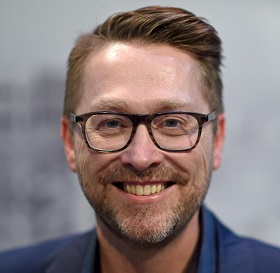
Jan Weiler (Düsseldorf, 28 oktober 1967)
De Hongaarse dichter en schrijver István Kemény werd geboren op 28 oktober 1961 in Boedapest. Zie ook alle tags voor István Kemény op dit blog.
Der Vater, wie er im Buche steht
Gib mir: ein Geheimnis. Einen Rat. Eine Stellung bei Hofe
Oder gib mir den einen, den Geheimrat bei Hofe
Einen, der altmodisch, bärtig und korpulent ist
Ein Realist der gleichwohl Wahrhaftiges spricht
Ein alter Schulfreund längst verstorbener Maler
Die Traumrolle jedes Schauspielers mit erfahrenem Alter
Einen, der heimlich bewundert wird von jedermann
Gegenstand vieler Witze, über die man herzhaft lachen kann
Schon zweimal verhasst, vier oder fünfmal nur langweilig
womöglich wird er bald wieder als Minister vereidigt
Seine Affären waren vor kurzem noch in aller Munde
Dass er ab und zu trinkt, macht unter Freunden die Runde
Auf großen Festen plaudert er haltlos und mit Genuss
doch fremde Plattitüden hält er diskret unter Verschluss
Einmal die Woche bittet er den Philosophen zu Tische
Als Amateurhistoriker pflegt er seine geistige Frische
Ob Tabakpfeife, oder Epoche, er kennt alle Details
nicht ein deutscher Fürstenname, den er nicht weiß
Er hat auch Schlechtes getan, er erkennt das Vergehen
doch kennt keine Reue, er macht nichts ungeschehen.
Er weiss, er müsste unfehlbar sein, weiss er ist es nicht
und könnte mich dennoch töten lassen, oder auch dich.
Ich wüsste, er sorgte für mich, auch wenn ich fremd wär
alles könnte ich sein, mich quälte keine Freiheit mehr.
Vertaald door Orsolya Kalász en Monika Rinck
Visiting The King
I know you are preparing for battle, Sir,
and your time is precious, for maybe it will be your
last night, your captains are waiting, because
even your strategy is incomplete, and your servants
are making your luxurious, though light and perhaps
last feast, and girls in their colorful tents
are beautifying themselves in a hurry,
you do not have much time left to chatter, especially
because I’ve come from the enemy camp,
I’ve grown up and learned there, there I was in love,
and there is my past, though I am not a traitor,
but a traveller, a wanderer,
wise and impudent, very brave at the moment
and even a bit surprised at that, but neither
mad nor drunk, and I do not want to kill
or to divert you, I’ve simply come
to ask, whether you send
a message towards the very edge,
since I am just on my way, to
call or shout from over there,
as I’m bored with God keeping silent.
Vertaald door Gábor Mezei
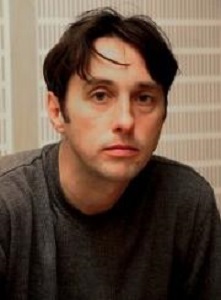
István Kemény (Boedapest, 28 oktober 1961)
De Vlaamse schrijver JMH Berckmans (Jean-Marie Henri) werd geboren in Leopoldsburg op 28 oktober 1953. Zie ook alle tags voor JMH Berckmans op dit blog.
Uit: Een beetje voorbij het huis van Elsschot
“Het zou trouwens de eerste keer niet zijn dat de witte mens de dikke koe haar smoel ineen timmert. Het zou de eerste keer niet zijn dat de witte mens het kot afbreekt. De witte mens heeft problemen. Hij gaat met z’n problemen naar Beretta maar Beretta heeft al honderdduizend keer gezegd dat ze hem niet kan helpen. Hij is al bij Landuyt geweest en Landuyt kon hem ook niet helpen. Hij heeft al in de doos gezeten en zelfs van de doos is hij niet wijzer geworden en op den duur hebben ze ‘m losgelaten. Tegen hem zegt iedereen witte mens, al heet hij eigenlijk Paul Serge Rosette, naar zijn peter en zijn meter en zijn doodgeboren broertje.
In de voorkamer ligt Mie Bees al jaren op sterven maar nu gaat ze het niet lang meer maken. Camilla de gorilla heeft de onderpastoor besteld voor de belezing van de stervenden. Alle anderen wachten in spanning af. De priester laat op zich wachten.
Het wordt steeds later. Misschien komt hij morgen pas, misschien zijn er vandaag te veel stervenden in de wereld van de levenden.
Carlos is vrijer van de dikke koe en Ludo Cleerbout is de vrijer van de zwarte heks en behalve de zwarte heks heeft niemand het hoog op met Ludo Cleerbout vanwege z’n maniertjes en z’n smoeltje en z’n vele, vele praatjes voor de vaak. Hij werkt aan de band in een autovelgenfabriek en brengt voor het overige de tijd zo maar een beetje zoek met platen draaien op fuiven en rondhangen tot de nacht in de dag verkleurt. Als de zwarte heks van school af is willen ze trouwen en ergens in de randstad gaan wonen met hun meubeltjes en hun stereo en hun autootje in de box. Hun Volkswagentje. Maar eerst wil ze de school af maken. De handelshumaniora op Mère Jeanne in de Tabaksvest. Zodat ze een baantje vindt op een kantoortje en ganse dagen pennen likken kan en haar zestienjarige kont verslijten tot er sleet op zit en ze veulens en kalveren baren kan.
En ten slotte is er het jong Veerle, maar het jong Veerle is bijkomstig, het jong Veerle is nog maar zeven, het jong Veerle heeft nergens weet van, het jong Veerle snapt toch de ballen van wat er hier allemaal aan de hand is. Het jong Veerle snapt de ballen van Big Jim.”
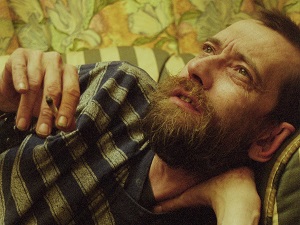
JMH Berckmans (28 oktober 1953 – 31 augustus 2008)
De Amerikaanse dichter en criticus John Hollander werd geboren op 28 oktober 1929 in New York. Zie ook alle tags voor John Hollander op dit blog.
The Mad Potter (Fragment)
Now at the turn of the year this coil of clay
Bites its own tail: a New Year starts to choke
On the old one’s ragged end. I bite my tongue
As the end of me—of my rope of stuff and nonsense
(The nonsense held, it was the stuff that broke),
Of bones and light, of levity and crime,
Of reddish clay and hope—still bides its time.
Each of my pots is quite unusable,
Even for contemplating as an object
Of gross unuse. In its own mode of being
Useless, though, each of them remains unique,
Subject to nothing, and themselves unseeing,
Stronger by virtue of what makes them weak.
I pound at all my clay. I pound the air.
This senseless lump, slapped into something like
Something, sits bound around by my despair.
For even as the great Creator’s free
Hand shapes the forms of life, so—what? This pot,
Unhollowed solid, too full of itself,
Runneth over with incapacity.
I put it with the others on the shelf.
These tiny cups will each provide one sip
Of what’s inside them, aphoristic prose
Unwilling, like full arguments, to make
Its points, then join them in extended lines
Like long draughts from the bowl of a deep lake.
The honey of knowledge, like my milky slip,
Firms slowly up against what merely flows.
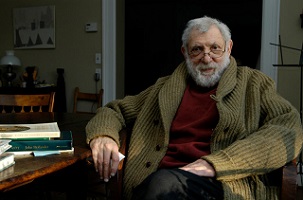
John Hollander (28 oktober 1929 – 17 augustus 2013)
Zie voor nog meer schrijvers van de 28e oktober ook mijn vorige blog van vandaag.
